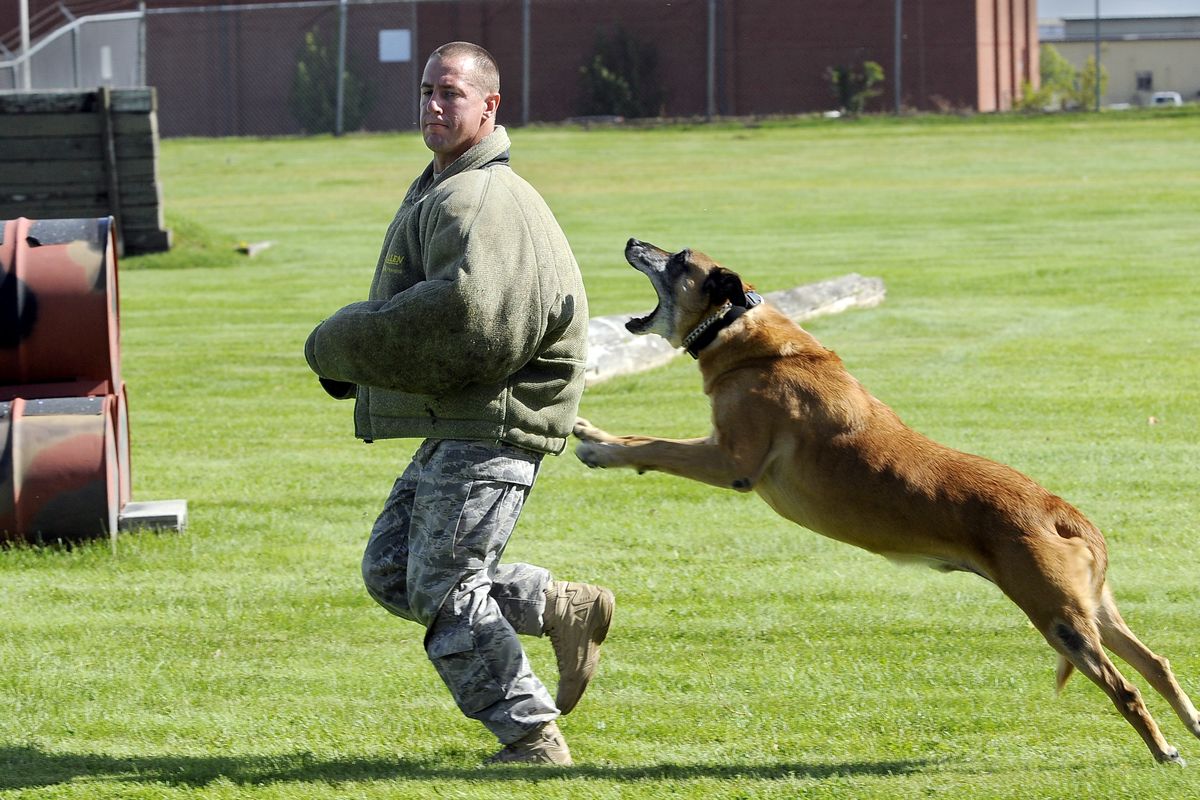Military dog Lucky nears retirement having lived up to name

Lucky, a military working dog based at Fairchild Air Force Base, has served four tours of duty in Iraq and Afghanistan.
His keen nose and no-nonsense ferocity are assets in the war zones, but luck has kept him alive.
He’s recovered from two bouts of cancer in his career. On the way to a mission in Iraq, he and a squad of soldiers survived an improvised bomb attack along a roadway. And in 2008, Lucky averted potential disaster when he sniffed out an explosive device fastened to a military generator at a forward base in Afghanistan.
“Lucky has had a good and storied career and he’s saved a lot of lives,” said Staff Sgt. J.G. “Buzz” Buzanowski, a spokesman at Fairchild.
Lucky and Staff Sgt. Gerald Martinez returned last week from their most recent deployment, a six-month tour in Iraq.
Now Martinez and other personnel in the 92nd Security Forces Squadron are pushing to have Lucky retired. They say he has served his country well.
A Belgian Malinois, Lucky is a type of sheepdog well-suited to the military. He is trained to remain cool under fire, yet can chase down a fleeing suspect on command with a burst of speed.
His nose can detect different explosives with high reliability.
Once he’s done working, Martinez said, “He’s like a 9-year-old kid. He likes to play. He loves his toys.”
Lucky is one of seven working dogs based at Fairchild. He turns 10 later this year.
Like all of the dogs, he was acquired and trained at age 1 by the Department of Defense Military Working Dog School at Lackland Air Force Base in Texas. The 90-day training program is followed by continuous training with a handler.
Belgian Malinois are generally preferred because they have fewer physical problems than German shepherds and are just as skilled at patrol work as they are at search and detection.
“They adapt a little better than the shepherds do to their environment,” said Tech. Sgt. Levi Wilson, who has been one of Lucky’s handlers during deployment.
“He’s like a light switch. You give him a command, and now he’s on,” Wilson said.
Overseas, the dogs are popular with troops, and are quartered in air-conditioned trailers with their handlers.
Martinez said he hopes he can adopt Lucky when the dog retires.
“He’s like my best friend,” Martinez said.
At Fairchild, Lucky and the other dogs are kenneled inside a working dog training compound, which is adjacent to the veterinary clinic.
In 2005, Lucky underwent surgery for cancer on a rear leg at Washington State University’s veterinary school, and was given radiation treatment to clear his body of any residual malignancy.
Last winter, veterinarian Katie Girsberger removed a skin cancer tumor from his other rear leg. A routine body check had revealed the tumor as a small scab in its earliest stage.
“Lucky did really, really well,” Girsberger said. “He is lucky.”